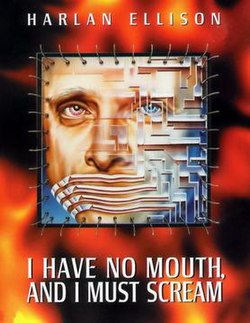I Have No Mouth, and I Must Scream (video game)
| I Have No Mouth, and I Must Scream | |
|---|---|

PC version box cover, has an opening in the front to display the mousepad featuring Harlan Ellison's face inside.
|
|
| Developer(s) | The Dreamers Guild |
| Publisher(s) |
|
| Producer(s) |
David Mullich Robert Wiggins |
| Designer(s) |
Harlan Ellison David Mullich David Sears |
| Programmer(s) | John Bolton |
| Artist(s) |
Bradley W. Schenck Peter Delgado Robert L. Miles |
| Composer(s) | John Ottman |
| Engine | SAGA |
| Platform(s) | MS-DOS, Mac OS, Windows, OS X, Linux, iOS, Android |
| Release |
MS-DOS, Mac OS
|
| Genre(s) | Point-and-click adventure |
| Mode(s) | Single-player |
| Aggregate score | |
|---|---|
| Aggregator | Score |
| GameRankings | 77% |
| Review scores | |
| Publication | Score |
| Adventure Gamers | |
| AllGame | |
| GameSpot | 4.3 out of 10 |
| PC Gamer (US) | 87% |
| Next Generation | |
| Awards | |
|---|---|
| Publication | Award |
| Computer Game Developers Conference | Best Game Adapted from Linear Media |
| Computer Gaming World | Adventure Game of the Year |
| Game Informer | Top 25 Horror Games of All Time - #22 (2014) |
| Game Developers' Choice Awards | 1997 Spotlight Awards |
I Have No Mouth, and I Must Scream is a point-and-click adventure game based upon Harlan Ellison's short story of the same title, developed by The Dreamers Guild, co-designed by Ellison and published by Cyberdreams in 1995. The game's story is set in a world where an evil computer named AM has destroyed all of humanity except for five people, whom he has been keeping alive and torturing for the past 109 years. Each survivor has a fatal flaw in their character, and in an attempt to crush their spirits, AM has constructed a metaphorical adventure for each that preys upon their weaknesses. To succeed in the game, the player must make choices to prove that humans are better than machines, because they have the ability to redeem themselves. Woven into the fabric of the story are ethical dilemmas dealing with issues such as insanity, rape, paranoia and genocide.
The game uses the S.A.G.A. game engine created by game developer The Dreamers Guild. Players participate in each adventure through a screen that is divided into five sections. The action window is the largest part of the screen and is where the player directs the main characters through their adventures. It shows the full-figure of the main character being played as well as that character's immediate environment. To locate objects of interest, the player moves the crosshairs through the action window. The name of any object that the player can interact with appears in the sentence line. The sentence line is directly beneath the action window. The player uses this line to construct sentences telling the characters what to do. To direct a character to act, the player constructs a sentence by selecting one of the eight commands from the command buttons and then clicking on one or two objects from either the action window or the inventory. Examples of sentences the player might construct would be "Walk to the dark hallway," "Talk to Harry," or "Use the skeleton key on the door." Commands and objects may consist of one or more words (for example, "the dark hallway"), and the sentence line will automatically add connecting words like "on" and "to."
...
Wikipedia
